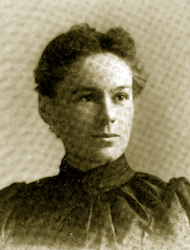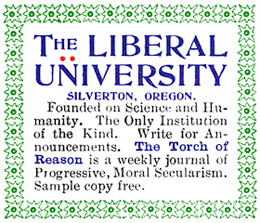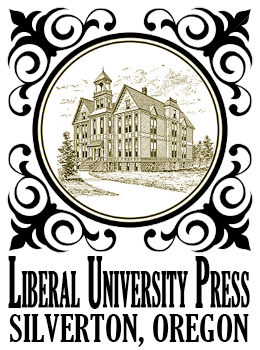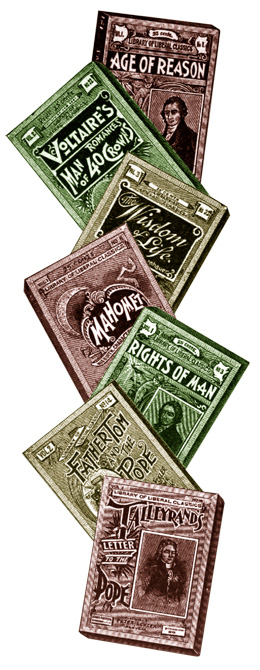By Mrs. Myra E. Withee — September, 1901
 St. Paul, Minnesota: There came to my hand a short time since a copy of a so-called Free Thought paper. As I have for many years been in sympathy with Free Thought, I eagerly scanned its pages thinking to find something of interest.
St. Paul, Minnesota: There came to my hand a short time since a copy of a so-called Free Thought paper. As I have for many years been in sympathy with Free Thought, I eagerly scanned its pages thinking to find something of interest.
The first article which met my notice in this paper and one which asks the question, “Was Christ a good man?” The author endeavors to show that instead of being a good man he (Jesus) was a decidedly bad one. As evidence of this he calls attention to the marriage feast where Jesus appeared. He speaks of this feast as a place of “drunken revelry, boisterous hilarity and coarse conversation.” Now upon what does he base these assertions? Upon the fact that wine was drunk. We know not whether the wine used was such as intoxicates, or simply fermented juice. We know that fermented wine is used at the majority of weddings· to-day, yet we cannot speak of all these as drunken revelries. Wine is used at entertainments of various sorts. It is given to the guest at dinner. It is given to the invalid to aid him to rise from his couch; and does it follow that at all these places where wine is used there is “drunken revelry, boisterous hilarity and coarse conversation?” And if these do not always follow, how can we consistently say there was coarse conduct at this marriage feast: while the only evidence we have is that wine was used?
In enumerating what the author supposes to be defects in the character of Jesus he says, “He frequently associated with Mary Magdalene, a woman of doubtful virtue.”
Why speak of Jesus’ association with this woman, even though it were known positively that she was wanting in virtue, as a defect in his character?
Would the author insinuate that Jesus was immoral if in fact he associated with a woman who was? No one could possibly arrive at such a supposition from the facts, save one who would under like circumstances behave unseemly.
If we are to criticize Jesus thus, why not criticize all the great unselfish souls, who look with compassion upon the weak and the fallen, who go into the slums, and other places where vice is fast sapping the lifeblood of human beings, and there seek to wrest them from its venomous fangs, and lead them out into a purer and fairer day?
The author further states, “I have no patience with Freethinkers, who prate about Christ being a good man.”
I believe that Jesus was a good man. The remarks made about him in the article referred to are quite unjust. I do not thus assert because Jesus was the founder of a religion, nor because he is worshipped by so large a following in the country in which I live: but J assert from the same motive that would prompt me to defend any other man or woman whom I thought to be unjustly slandered.
Furthermore, I admire Jesus because he was a man who feared not to impugn the beliefs and customs of the people among whom he lived; but considered matters for himself: in fact. he was a Freethinker. He was persecuted and put to death for opinion’s sake. He knew well the penalty for offending a king; but believing that he knew a better way than the ways of those about him, he resolved to speak and suffer the consequences for the sake of humanity. He did so and was put to death, as many another Freethinker and martyr has been, both before and since his time.
We must always bear in mind that much has been written of Jesus by very enthusiastic. but, at the same time, very ignorant followers; but one thing is certain, and should be recognized by everyone, Jesus was put to death for expressing what he believed to be truth, out of love for humanity.
In spite of the fact that there is so much to prove the goodness of Jesus, the author of the article referred to concludes with this statement: “Brief as this article is, it establishes the fact that Jesus was not a good man.”
The next article which attracted my attention in this Free Thought publication was one entitled “Cranks.” The author, after making some preliminary remarks about cranks in general, in which he makes liberal use of slang, which, according to his own statement, is the language of rowdies, proceeds to tell us about a lady at Leavenworth, Kansas, who, he thinks, is entitled to be called the “queen crank of America.” The reasons the author gives for speaking of the lady thus are these—she is an anti-vivisectionist, a vegetarian from principle, believes animal life sacred, and refuses to kill even obnoxious insects, and he says, “But while Mrs. ——’s morbid sympathies gush out for snakes and noxious insects, she preys upon the innocent and helpless denizens of the vegetable kingdom with the most heartless abandon.”
He who can discern no material difference between the plucking of an ear of corn and the slaying of a lamb must indeed be dull; and he who can perceive no difference between the killing of snakes and noxious insects (when it is unnecessary for our own preservation and cleanliness so to do) and the pulling of weeds, is also dull.
He who hath no pity in his heart, save for kith and kin, and scantily supplied even with this, says to the humanitarian, “You are inconsistent. Why prate about the rights of animals, and your love and compassion for the same, when you acknowledge that it is sometimes necessary to kill them?”
This is illogical. Because it is sometimes necessary for our preservation and cleanliness to destroy, is this any excuse for all the ruthless slaughter which abounds in Christendom? Whoever heard man called inconsistent because he finds it necessary at times, for the protection of home and family, to kill human beings, but at other times holds human life sacred?
It seems to be the order for life to sustain life; but as man is so bountifully supplied from the vegetable kingdom, and the fact so well established that he can be properly nourished from that kingdom, why prey upon animals? They apparently enjoy this world as well as ourselves; are capable of experiencing mental as well as physical suffering, and cry out to us for mercy, as plainly in their own language as e’er was uttered by the tongue of man?
The author of “Cranks” remarks in conclusion that “abstractionism has no side, top, bottom or circumference. It has been the bane of the world, and it is a matter of profound regret that so many Liberals allow themselves to be caught in its devious meshes.”
It is surprising that all Freethinkers, liberated as they are from the false conceptions that man was made full grown to start with; that he is endowed with an immortal spark which other beings have not; and which makes him superior in the sight of his maker to all else, and by reason of this he is entitled to a future life, while all else is doomed to annihilation— free as they are to look about them and consider the relation they bear to other sentient beings, are not alive to the situation; and it is inconceivable why, in view of all this, they are not anti-vivisectionists and vegetarians.
Will the Freethinker who ridicules the anti-vivisectionist, and vegetarian, please tell us why he holds human life sacred? Why he feels in duty bound to protect the most degraded specimens of the human kind? Why he upholds reformatories, inebriate asylums, homes for the friendless, and prisons, to house human beings, many of whom have sunk to depths of degradation which place them far below the brute? Is it not inconsistent to show so much consideration for these mean specimens of human life, that are a far greater curse to humanity than the worm they step out of their way to crush, and kill the innocent lamb which is our common benefactor?
I do not mean to insinuate that I would have these degraded specimens of human life treated with any less kindness, but, on the contrary, would in many instances have them treated with more, but would also have consideration shown for other sentient beings as well.
We know that we might in many ways pattern after the habits of the animal to advantage. Has not the sluggard been directed to the ant to “consider her ways and be wise?” The animal manifests a greater degree of parental love, and a higher degree of morality than the average human. Where is the brute that will turn her offspring over to a nurse to care for while she roams leisurely through the jungles for amusement? Is the cow content, when her offspring is taken from her (even though she is near it and sees it cared for), to graze on the green fields, and bask in sunshine, all unconcerned? Does not the brute love her unborn offspring, and look longingly and lovingly for the birth of the savior, while millions of human beings have come, and millions continue to come into this world, as unwelcome guests, the fruit of purely selfish gratification?
I find there is much that Free Thought has meant to me; and much that it has not meant. It has not meant the rummaging through sacred books, of which the founders of religion wrote not a word, culling out the seeming absurdities, continually flaunting them before the public and crying out “chaff,” “chaff,” “chaff.” It has not meant the crushing out of the finer impulses, which man is capable of feeling, either in myself or others. It has not meant a desire to ridicule persons whose qualities o( mind and heart enable them to respond to finer impulses than my own, and call them cranks and lunatics. It has not meant to be deaf to the piteous cries of other beings, that are being slaughtered and persecuted in various ways by the cruel hand of man.
Free Thought has meant to me the unfettering of the mind and heart from creeds and superstition, that we might be free from all fear of God or Devil; and feel perfectly at liberty to consider for ourselves all matters pertaining to this life, or the life hereafter, and decide to the best of our ability what is truth and what error in all our sacred books and elsewhere. It has meant to me to look with compassion upon all sentient beings, not only the graceful and beautiful, but the awkward and obnoxious as well; and if we are unable to see that it is all good in its place, then condemn not those which seem to us repulsive, but deplore rather the causes which brought such into existence.
If animals are able to appreciate differences, think you the slug would not exchange his mean, slimy coat for the beautiful dress of the peacock? Think you he would not exchange his slow, awkward movements for those of the lithe, graceful deer? Think you he would not exchange his muteness for the ability to’ warble like the nightingale? They are not what they would be, but what they are compelled to be.
Free Thought has meant to me a realization of that great truth of “oneness,” not only of humanity, but of all things. It has meant publications which would not be devoted entirely to iconoclasm, but would recognize the truth contained in all religions; truth, simple, unadulterated, beautiful; robbed only of its superfluous garments.
If we were to go into a community and find the people in ecstasy over a piece of statuary which they believed to be the most beautiful in the world, and we should find they really had the work of a master, but in their inability to appreciate beauty in its simplicity they had endeavored to add to the model their own crude conceptions of the beautiful; and had bedaubed it with paint and clothed it in robes of inharmonious colors, which made it seem a thing ludicrous, rather than one of beauty, to our sense of vision; would it be wise to insist upon demolishing the whole? Would it not be better to seek only to rob it of that which detracted from its beauty? Or, supposing we found the work inferior and believed we could produce a better one, would it then be wise to endeavor to tear down the old before erecting the Dew? Until the people were convinced that we had something better, they would cling tenaciously to the old; therefore, it were better if we had a more perfect ideal, to present it, and if it was superior it could not fail to be appreciated; and in time the old, being neglected, would crumble of itself.
Let the Freethinkers, if they can give us a better system of ethics than is contained in any of our sacred books, produce it. Let their publications be filled with helpful. inspiring thoughts, for it were better to leave the sacred books in our homes, with the gems of truth embedded though they are in superstition and error, than replace them with publications, coarse and vulgar which incite nothing save a spirit of iconoclasm.
As I said, Free Thought has meant much to me. It has meant so much that I have fancied something in it not unworthy to be called religion. I have believed there was something in it to inspire devotion—not a worshiping of God or gods, but a profound reverence for all that is good and true—an earnest desire for the supremacy of the good over the evil; and a submission of the lower nature, which is coarse and vulgar, to the higher, which is refined and beautiful; but, alas! I find that there are Freethinkers, and there are also Freethinkers I And find that, were we called together, there could be no unity of thought or purpose; for there would be a diversity of opinions as to what was right and what wrong, and various ideas as to the mission of Free Thought.





